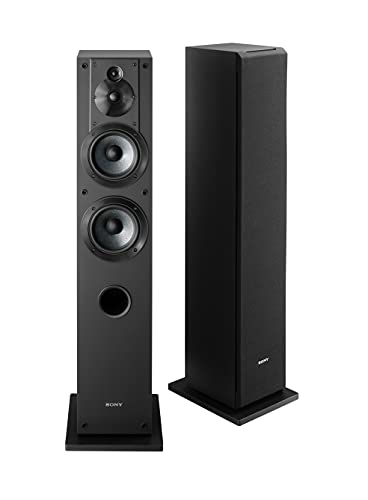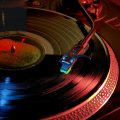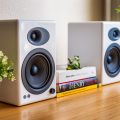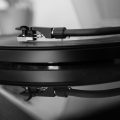Looking to upgrade your home setup? Or perhaps you are looking to downgrade as the volume is killing your neighbors? What does it mean to upgrade or downgrade a set of speakers? What are the differences between bookshelf speakers vs tower speakers?
All this and more today as we explore the outer rings of speakers for your delectable delight.
Table of Contents
- What are Bookshelf Speakers?
- What are Tower Speakers?
- Bookshelf Speakers
- Tower Speakers
- Final Tones
- FAQs Bookshelf Speakers vs Tower
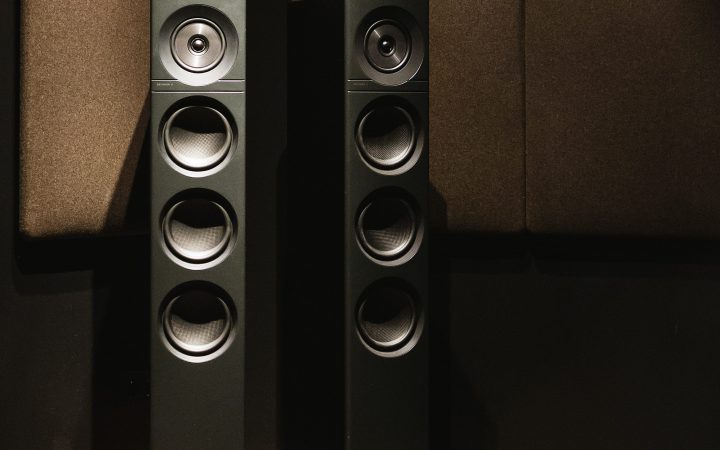
What are Bookshelf Speakers?
In essence, a bookshelf speaker is simply a smaller speaker that can be conveniently placed on a shelf, stand, or another elevated surface that is not necessarily touching the ground. These are sometimes also known as desktop speakers for the same reason. If your record player did not come with speakers, then this will be necessary.
Some bookshelf speakers are active while others are passive, meaning some have built-in amplification and others do not. If you like your speakers to be powered speakers, then perhaps now would be the time to say something or forever hold your peace.
It is, however, more likely to be the case that a speaker of this kind is passive, meaning that they do not have their own built-in amplification capabilities. Thus, you will need to use them with a dedicated stereo system or receiver amp, to say the least.
In contrast with floor-standing speakers – which will be connected to the ground and, thus, can act as a conduit for the deeper frequencies – the bass response on bookshelf speakers is a little lacking. If you are after a more bassy setup for more bass-driven music, then perhaps these will not be the speakers for you.
What are Tower Speakers?
So, in contrast with a bookshelf speaker, a tower speaker is more likely to come on its own as a standalone speaker, which is large enough to stand on its own without leaning on a stand or shelf.
Sometimes referred to as floorstanding speakers because of their ability to stand on the floor without support from elsewhere, they can come in both active and passive variations. Again, though, a floor-standing speaker is more likely to come as a passive speaker, like most bookshelf speakers.
So, you might be thinking that bookshelf and tower speakers really are not that much different, right? Well, desktop and floorstanding speakers sure have their similarities, but the latter tends to be multi-driver driven, meaning they have dedicated drivers within for bass, mid-range, and high-end.
Coupled with the typically greater size of these speakers, there is a far wider opportunity for dynamic range in the overall sound quality. A dedicated bass driver really is not to be sniffed at. Most floorstanding speakers will bear one proudly, and it is precisely this that separates them from others.
Bookshelf Speakers
Looking at this dichotomy between bookshelf vs tower speakers is perhaps easier with a handy list like so.
Pros
And there are plenty to choose from:
- The smaller size makes them easier and more convenient to place in a smaller floor space.
- There are plenty more budget-friendly options available with these kinds of speakers compared to a floorstanding speaker.
- The sound response is usually clean and balanced.
- The speakers are usually passive though there are plenty of options for powered speakers and other active speaker types.
- Their smaller size also makes them easier to transport should you decide to move house all of a sudden or even to move things around in your own house.
Cons
Just as there are pros for bookshelf speakers, there must be cons too:
- While the smaller size will be good for transportability and ease of setup, this lack in size will also equate to a lacking bass response when comparing desktop and tower speakers.
- If you want to improve the sound response, you will need to invest in some speaker stands.
- Bookshelf speakers are more likely to be 2-way speakers as opposed to 3-way. There are options for 3-way bookshelf speakers, just far fewer of them.
- Their smaller size will also equate to a quieter overall volume than it might be for a speaker towering high above them.
- This smaller size will, yet again, have more negative effects, including a markedly less detailed sound reproduction, especially when boosted to volumes louder than its means.
Tower Speakers
And now, we must measure these pros and cons against those of the tower speaker.
Pros
And there are plenty to choose from here too:
- The sound reproduction here is full and can boast a for more wide dynamic range.
- The frequency range is also wider, especially in the bass frequencies, as propelled through a separate bass driver.
- Unlike the bookshelf speakers, there are plenty more options for 3-way speakers if that is more your thing.
- These speakers are louder and, thus, will typically be able to boast higher volumes at a cleaner fidelity.
- Being larger, there is an inherent surround sound effect that can help you feel more immersed in the sound world.
- By their very nature, these speakers do not require a stand and will naturally be around ear height when seated
Cons
Just as there are pros, there must be cons:
- For all their increased powers, tower speakers are typically a more expensive option than just using some bookshelf speakers. This is clearly because of their increased size and sonic capabilities.
- Just as there are fewer 3-way options with bookshelf speakers, there are also fewer active speaker options with tower speakers.
- Tower speakers are inherently larger and take up more space. Being planted on the floor means they will also take up perhaps precious floor space, making them harder to hide in space and more difficult to move when the time comes.
- While you can usually place a bookshelf speaker anywhere and get a broadly good sound, tower speakers need to be placed in an optimum location to sound at their best.
Final Tones
So, there you have it! Hopefully, you are feeling much more informed and enlightened by this knowledge and ready to go out into the world and change your speaker setup for the better.
FAQs Bookshelf Speakers vs Tower
Are bookshelf speakers as good as tower speakers?
This depends on your metric. If you are looking for a set of speakers that are better at imaging, more transportable, more affordable, and with more options overall, then perhaps they are better than tower speakers. If, however, you are looking for a set of speakers that are louder, offer a greater dynamic range, stronger bass response, improved soundstage, and, overall, a more immersive experience, then perhaps tower speakers are better for your purposes.
Which is better – a sound bar or a tower speaker?
This depends on your metric and your purposes. A sound bar is usually better if you are intending to use it with a TV or a home entertainment system – its shape means that it can easily be placed in front of a TV as though at the foot of a messiah. Tower speakers are also good for use in a home entertainment system, though are more often associated with simply listening to music.
Do bookshelf speakers image better than floorstanding speakers?
This depends on the models that you are comparing. Some floorstanding speakers will image better than some bookshelf speakers, offering more attack and a greater stereo field and the like. However, more generally and objectively, bookshelf speakers are more likely to offer better imaging, as well as more integration into space and more supposed coherency (whatever the heck that means). On the other hand, floorstanding speakers are far more capable in the realms of bass depth and lower frequency responses, not to mention dynamics and soundstage options, thanks in no small part to the drivers installed within the speakers that groom each central facet of the frequency range.
Are bookshelf speakers good enough?
This will depend on your metric for what is deemed good enough as well as what you intend to use them for, though there are plenty who deem them ‘good enough’. Plenty of producers use bookshelf speakers to mix, master, and otherwise produce music. In this era where the medium is totally democratized, and everyone is making music in their own home, not everyone can afford to install a massive set of tower speakers, either financially or for the sanity of their neighbors. Thus, bookshelf speakers are the new way for home producers and bedroom artists to produce music without all of the expense.


